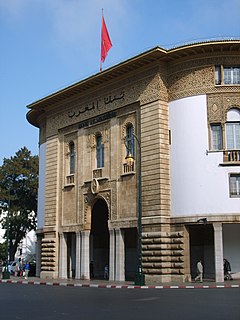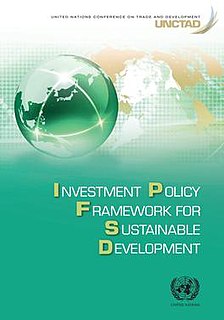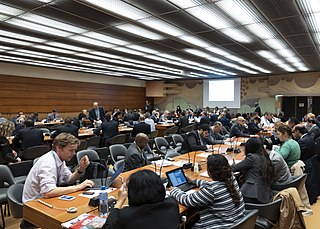
The economy of Mauritius is a mixed developing economy based on agriculture, exports, financial services, and tourism. Since the 1980s, the government of Mauritius has sought to diversify the country's economy beyond its dependence on just agriculture, particularly sugar production.

The economy of Morocco is considered a relatively liberal economy, governed by the law of supply and demand. Since 1993, Morocco has followed a policy of privatization of certain economic sectors which used to be in the hands of the government. Morocco has become a major player in African economic affairs, and is the 5th largest African economy by GDP (PPP). The World Economic Forum placed Morocco as the 1st most competitive economy in North Africa, in its African Competitiveness Report 2014–2015.

International development or global development is a broad concept denoting the idea that societies and countries have differing levels of economic or human development on an international scale. It is the basis for international classifications such as developed country, developing country and least developed country, and for a field of practice and research that in various ways engages with international development processes. There are, however, many schools of thought and conventions regarding which are the exact features constituting the "development" of a country.

The Millennium Development Goals (MDGs) were eight international development goals for the year 2015 that had been established following the Millennium Summit of the United Nations in 2000, following the adoption of the United Nations Millennium Declaration. These were based on the OECD DAC International Development Goals agreed by Development Ministers in the "Shaping the 21st Century Strategy". The Sustainable Development Goals (SDGs) succeeded the MDGs in 2016.
The Millennium Project was an initiative that focused on detailing the organizational means, operational priorities, and financing structures necessary to achieve the Millennium Development Goals or (MDGs). The goals are aimed at the reduction of poverty, hunger, disease, illiteracy, environmental degradation, and discrimination against women. At the United Nations Millennium Summit in September 2000 world leaders had initiated the development of the MDGs and had set a completion date for the project of June 2005.

Poverty reduction, poverty relief, or poverty alleviation, is a set of measures, both economic and humanitarian, that are intended to permanently lift people out of poverty.
The Earth Institute is a research institute at Columbia University that was established in 1995. Its stated mission is to address complex issues facing the planet and its inhabitants, with a focus on sustainable development. With an interdisciplinary approach, this includes research in climate change, geology, global health, economics, management, agriculture, ecosystems, urbanization, energy, hazards, and water. The Earth Institute's activities are guided by the idea that science and technological tools that already exist could be applied to greatly improve conditions for the world's poor, while preserving the natural systems that support life on Earth.

Mahmoud Mohieldin, is the World Bank Group's senior vice president for the 2030 Development Agenda, UN Relations, and Partnerships. He serves as a board member on the Global Partnership for Sustainable Development Data, as well as an observer to the EU Multi-Stakeholder Platform for the SDGs. Mohieldin previously served as corporate secretary, president's special envoy, and managing director for the World Bank Group.
Millennium Promise, or The Millennium Promise Alliance, Inc., is a non-profit organization incorporated under the laws of the State of Delaware, dedicated to ending extreme poverty within our lifetime. Its flagship initiative is the Millennium Villages Project, which highlights how integrated, community-led development, even in some of the poorest communities across rural sub-Saharan Africa, can lead to progress in achieving the Millennium Development Goals (MDGs) and can provide communities with the basic tools and necessities to break out of poverty, on the path toward self-sustainable development. Millennium Promise oversees the Millennium Villages Project in collaboration with the Earth Institute at Columbia University and the United Nations Development Program (UNDP).

Access to water supply and sanitation in Ethiopia is amongst the lowest in Sub-Saharan Africa and the entire world. While access has increased substantially with funding from foreign aid, much still remains to be done. Some factors inhibiting the achievement of these goals are the limited capacity of water bureaus in the country's nine regions, two city administrations and water desks in the 770 districts of Ethiopia (woredas); insufficient cost recovery for proper operation and maintenance; and different policies and procedures used by various donors, notwithstanding the Paris Declaration on Aid Effectiveness.
The Centre for Development and Enterprise (CDE) is an independent public policy research and advocacy non-profit organisation established in 1995. It is one of South Africa’s leading development think tanks, focusing on critical national development issues and their relationship to inclusive economic growth and democratic consolidation. CDE has a special focus on the role of business and markets in development. CDE advocates a high-growth and labour intensive economic strategy reliant on market-based solutions.

Kenya Vision 2030 is the country's development programme from 2008 to 2030. It was launched on 10 June 2008 by President Mwai Kibaki. Its objective is to help transform Kenya into a "newly industrializing, middle-income country providing a high quality of life to all its citizens by 2030 in a clean and secure environment." Developed through "an all-inclusive and participatory stakeholder consultative process, involving Kenyans from all parts of the country," the Vision is based on three "pillars": Economic, Social, and Political. The Vision's adoption comes after the country's GDP growth went from 0.6% in 2002 to 6.1% in 2006, under Kibaki's Economic Recovery Strategy for Wealth and Employment Creation (ERS).
Tanzania has a current population of 55.57 million people. Current statistics form the World Bank show that in 2011, 49.1% of Tanzanians lived below US$1.90 per day. This figure is an improvement over 2007's report indicating a poverty rate of 55.1%. Tanzania has seen annual GDP gains of 7% since 2010 and this economic growth is attributed to this positive trends for poverty alleviation in Tanzania. The 2019 World Bank report showed that in the last 10 years, poverty has reduced by 8 percent, from 34.4% in 2007 to 26.4% in 2018.

The Investment Policy Framework for Sustainable Development (IPFSD) is a dynamic document created to help governments formulate sound investment policy, especially international investment agreements (IIAs), that capitalize on foreign direct investment (FDI) for sustainable development. It was prepared by the Division on Investment and Enterprise (DIAE) of the United Nations Conference on Trade and Development (UNCTAD). IPFSD is not a negotiated text or undertaking between States; but rather an initiative by the UNCTAD Secretariat that represents expert guidance while leaving domestic policy makers free to adapt and adopt. IPFSD is the result of numerous consultations with experts and is intended as a platform to provide for further consultation and discussion with all investment stakeholders. The main objective of the IPFSD is to create a balance between the rights and obligations of States and investors while maintaining attractive investment environments.
UNCTAD's Division on Investment and Enterprise (DIAE) is a research and policy practice centre of the United Nations Conference on Trade and Development whose work focuses on investment and enterprise with a particular view on development. The Division's overarching mandate is to steer sustainable development and inclusive growth objectives through investment and enterprise development, productive capacity-building, industrialization and economic diversification. Its work programme is tailored to serve all UN member States, with a particular emphasis on the needs of least-developed and other structurally weak and vulnerable economies.

The biennial World Investment Forum (WIF) is organized by the United Nations Conference on Trade and Development (UNCTAD) to promote investment for sustainable development and facilitate policy dialogue among a diverse community of investment stakeholders. The forum brings together policymakers, including Heads of State and Government, Ministers and other government officials responsible for investment; representatives from the private sector, including CEOs; international organisations working in the area of sustainable development and poverty reduction; thought leaders from academia and research institutions; and other members of the international investment community, including treaty negotiators, investment promotion and location experts, heads of sovereign wealth funds, heads of stock exchanges, and NGOs.

The Millennium Development Goals Achievement Fund (MDG-F) was an international cooperation mechanism committed to eradicating poverty and inequality and to accelerating progress towards the Millennium Development Goals (MDGs) worldwide. Its aim was to improve livelihoods and to influence public policy, which made it responsive to the needs of the poorest populations.
Extreme poverty is defined as living on less than 2.50 United States dollars (USD) purchasing power parity. Uganda has made significant progress in eradicating poverty and achieved the first millennium development goal of halving the number of people in extreme poverty. Uganda was listed as the 9th most successful country in Africa as regards poverty eradication. The percentage of Ugandans living in absolute poverty has been on a substantial decline, and the finance ministry in the country projected that the extreme poverty level will be reduced to 10% in the future. This success has been attributed to the deliberate efforts to combat poverty in the country by numerous national strategies that are explained below.
This article examines trends and developments in science and technology in Malawi.

Elizabeth Asiedu is a professor of economics at the University of Kansas. She has facilitated research that is centered around foreign aid, foreign directed investment (FDI), and gender. She is a founder of the Association for the Advancement of African Women (AAAWE), as well as the current president of the organization. Asiedu is an editor of the Journal of African Development.











